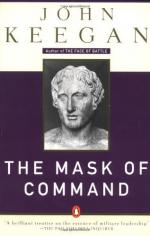
|
| Name: _________________________ | Period: ___________________ |
This test consists of 5 short answer questions, 10 short essay questions, and 1 (of 3) essay topics.
Short Answer Questions
1. Keegan compares Alexander to whom?
2. How did Wellington dress when going into battle?
3. Why did many of the other soldiers view Wellington with some jealousy?
4. The author states that Alexander was deeply affected by two things during his childhood - his love of Homer's epic poetry and the extreme and eccentric beliefs of whom?
5. At age ___________, Alexander went to war under Philip's command for the first time.
Short Essay Questions
1. Describe the army Alexander inherited from his father.
2. What did Wellington do when the French set fire to the chateau at Hougomont? Why did he do this?
3. How does Alexander look as he rides into battle? Why is this important?
4. How was Alexander able to conquer Persia?
5. Compare the upbringing of both Wellington and Alexander.
6. In Chapter Two, "Wellington the Man," what does the author reiterate? Why?
7. Why might the author use the word "abstractedly" to describe Wellington?
8. How did Macedonia's wealth compare to the wealth of other countries?
9. Why was, and is, it important for a leader to have good oration skills?
10. How did Wellington treat his men? What might this reveal about him?
Essay Topics
Write an essay for ONE of the following topics:
Essay Topic 1
Macedonia had an abundance of natural resources.
Part 1) What did Macedonia lack? How did this affect Alexander and his people? How did Alexander make up for what his nation was lacking?
Part 2) What resources did the other nations described in this book have? What were they lacking? How did their leaders use these resources? How did they deal with what was lacking?
Part 3) What resources does our own country have? What are we lacking? What is done with the resources we have? How do we deal with what we are lacking? Do you believe our country manages our resources effectively? Why or why not?
Essay Topic 2
The leaders in this book had differing relationships with their men.
Part 1) How did these leaders feel about their men? How did these feelings influence their behavior toward their soldiers?
Part 2) Do you believe that a leader should trust his or her soldiers? Why or why not? Should a leader physically lead his or her army? Why or why not?
Part 3) What do you believe is the attitude of the U.S. military leaders toward their soldiers today? Why do you believe this? Does this attitude toward the American soldier today differ from the past? Explain.
Essay Topic 3
Western civilization considered WWI "the" war.
Part 1) Why was WWI viewed in this way? How was this reflected in weapon technology and military might?
Part 2) Based on this fact, might the west have expected more wars such as this one? Why or why not? How might "the" war have led to subsequent wars?
Part 3) Do you believe another world war will occur? Why or why not? Predict what this war would be like, based on the information given in this book.
|
This section contains 1,290 words (approx. 5 pages at 300 words per page) |

|




